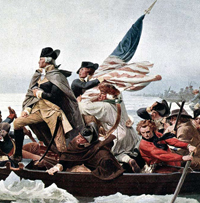1776
Common Sense, by Thomas Paine
Before “Common Sense,” most Americans assumed it was their duty to obey the laws of the British Crown, but after its publication this deference suddenly seemed absurd, says Lorraine Pangle, associate professor of government, who studies early american political philosophy.
“Government even in its best state is but a necessary evil,” Paine famously stated. “I offer nothing more than simple facts, plain arguments, and common sense.”
Originally published in Philadelphia, the 79-page pamphlet that captured the emerging spirit of the revolution and cost only one shilling was soon republished or extracted in newspapers throughout the colonies, as well as England and scotland.
“Paine’s polemic was the most effective piece of propaganda in american history,” says H. W. Brands, professor of history. “It provided the words for thoughts that had been rattling around the american colonies for months and years, and it propelled the american people toward independence.”
1788
The Federalist, by Alexander Hamilton, James Madison and John Jay
Seventy-seven of the 85 articles advocating the ratification of the U.s. Constitution that made up the “The Federalist” originally appeared in new York City newspapers under the pseudonym “Publius.” a two-volume compilation was published in 1788, and subsequent scholarship revealed the authors to be alexander Hamilton (51 articles), James Madison (29 articles) and John Jay (five articles).
“Prior to the ‘Federalist Papers’ most citizens believed that any expansion of centralized governmental power would curtail liberty,” says Mark Longaker, assistant professor of rhetoric and writing and author of “Rhetoric and the Republic: Politics, Civic Discourse, and Education in Early America.
“Jay, Hamilton and Madison argued that expanding the federal government in careful ways could actually increase liberty. since their effort, nearly every major expansion of the federal government’s size or authority—from FDR’s (Franklin Delano Roosevelt’s) new Deal to George W. Bush’s Department of Homeland security—has repeated this argument: more government can mean more freedom.”
Today the papers serve as an important source of interpre¬tation of the Constitution by scholars, lawyers and judges. as of 2000, “The Federalist” was quoted 291 times in supreme Court decisions, according to historian Ron Chernow.
1788
Narrative of the Life of Frederick Douglass, An American Slave; by Frederick Douglass
One of the most influential leaders in african-american his¬tory, escaped slave Frederick Douglass challenged the conscience of the american people with his autobiography that vividly described his life as a slave.
“Douglass’s narrative invigorated the abolitionist move¬ment with an intimate and eloquent account of the physical and psychological evils of slavery and endures as one of america’s most powerful meditations on the meaning and value of freedom,” says Shirley Thompson, assistant professor of american studies, who researches narratives of slavery and freedom. “It extended an african-american tradition of improvisation and self-making and remains a touchstone for african-american literature and political philosophy today.”
Within three years of its publication, Douglass’ “narrative” had sold thousands of copies and was translated into several languages. The author continued his career as a powerful anti-slavery lecturer throughout the free states and embarked on a 21-month lecture tour in England, Ireland and Scotland.
“Where justice is denied, where poverty is enforced, where ignorance prevails, and where any one class is made to feel that society is an organized conspiracy to oppress, rob and degrade them, neither persons nor property will be safe,” Douglass wrote.
